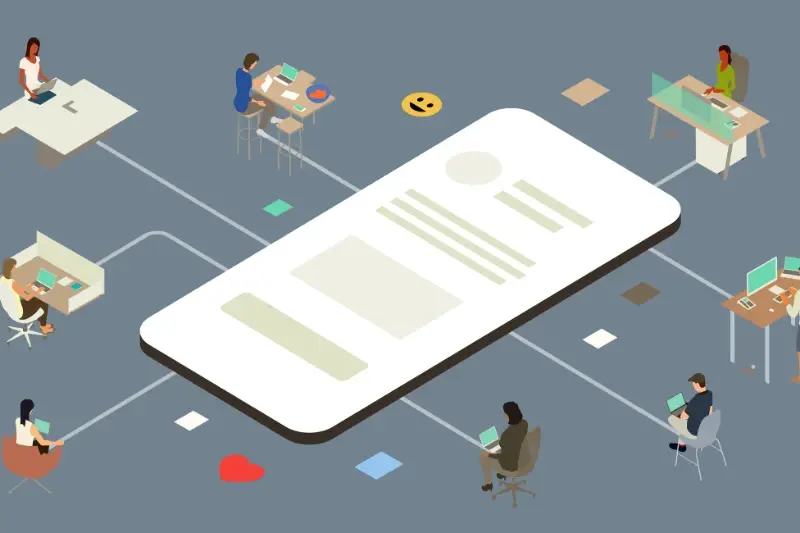From Complaints to Compliments: Turning App Support Into Your Secret Weapon
Every day, thousands of mobile apps lose users not because of bugs or poor design, but because of terrible support experiences. A single frustrating interaction with customer service can turn your most loyal users into vocal critics—and trust me, they will tell everyone about it. What's worse is that most app developers treat support as an afterthought, something to sort out once the app is live and problems start rolling in.
The thing is, your support team isn't just there to fix problems; they're your frontline warriors fighting for user satisfaction and service excellence. When someone downloads your mobile app, they're not just getting a piece of software—they're entering into a relationship with your brand. And like any good relationship, communication is everything.
Great support doesn't just solve problems; it creates advocates who will defend your app in the app store reviews and recommend it to their friends.
Most companies get this backwards. They pour millions into development and marketing, then staff their support desk with inexperienced agents armed with generic responses. But here's what we've learned after working with hundreds of apps: the businesses that treat support as a strategic advantage—not a cost centre—are the ones that build lasting success. Your support team can become your secret weapon for turning frustrated users into your biggest fans.
Understanding Why App Support Matters More Than You Think
When I first started developing mobile apps, I thought the hard work was done once we hit "publish" on the app store. How wrong I was! What I discovered over the years is that launching your app is just the beginning—what happens after launch can make or break your success.
App support isn't just about fixing bugs or answering the occasional question. It's about building relationships with your users and showing them you care about their experience. When someone takes the time to download your app, they're giving you a chance to solve their problem or make their life easier. If something goes wrong and they can't get help, they won't just delete your app—they'll probably tell their friends about the bad experience too.
The ripple effect of good support
Good app support creates a ripple effect that goes far beyond solving individual problems. Happy users become your biggest advocates; they leave positive reviews, recommend your app to others, and stick around longer. On the flip side, poor support can turn even the most loyal users into vocal critics who share their frustration across social media and review platforms.
The truth is, your app support team might be the only human contact your users ever have with your brand—make it count.
The Real Cost of Poor Support—Lost Users and Damaged Reputation
I've watched countless mobile apps go from hero to zero, and poor support is often the silent killer. You might think a few unhappy users won't hurt your business—but those users don't just disappear quietly. They leave reviews, tell their friends, and share their frustrations on social media. What starts as a simple support issue can snowball into a reputation nightmare that takes months to fix.
The numbers don't lie when it comes to user behaviour after a bad support experience. Research shows that 89% of users will stop using a mobile app after encountering poor customer service. That's not just a lost download—that's a lost customer who might have spent money, shared your app, or become a long-term advocate for your brand.
The Ripple Effect of Poor Support
When users have a bad experience, they don't keep it to themselves. Here's what typically happens:
- They leave negative reviews on app stores (which hurt your rankings)
- They complain on social media platforms
- They warn friends and family about your app
- They never give your app a second chance
- They choose competitors who offer better service excellence
The worst part? Fixing a damaged reputation costs far more than preventing the problem in the first place. User satisfaction isn't just about keeping people happy—it's about protecting your brand integrity and ensuring long-term success.
Track your app store reviews weekly and respond to negative feedback within 24 hours. This shows potential users that you care about solving problems and maintaining service excellence.
Building Your Support Foundation—Team Structure and Response Systems
Setting up proper support isn't just about hiring a few people and hoping for the best—it needs proper structure. I've seen too many apps launch with brilliant features but completely fall apart when users need help. The truth is, you don't need a massive team to start with, but you do need clear systems.
Getting Your Team Structure Right
Start with one dedicated support person who actually understands your app inside and out. This person needs to be able to handle everything from password resets to complex technical issues. As you grow, you can add specialists, but that first person sets the tone for everything that follows.
Response Systems That Actually Work
Your users don't care about your internal processes—they just want answers quickly. Set up clear response time targets and stick to them. Most users expect some kind of acknowledgement within a few hours, not days.
- Set up automated responses that give users realistic timeframes
- Create internal escalation paths for complex issues
- Use ticket systems that track everything from start to finish
- Make sure your team can actually test and reproduce user problems
The key is being honest about what you can deliver. Promise 24-hour responses if that's what you can manage—don't promise 2 hours if you can't deliver. If you're working with an app development agency, make sure post-launch support responsibilities are clearly defined from the start, or you might find yourself needing to transition to new development partners.
Turning Negative Feedback Into Positive Change
Nobody likes getting complaints about their mobile app—I won't pretend otherwise. But here's what I've learned after building apps for nearly a decade: negative feedback is actually one of your most valuable assets. Think about it this way; users who complain are users who still care enough to reach out rather than just deleting your app and moving on.
The key is creating a system that turns these complaints into actionable improvements. When someone reports a bug or suggests a feature, they're giving you free market research. They're telling you exactly what needs fixing to improve user satisfaction. I always tell my clients to keep a running list of common complaints—patterns emerge quickly and these patterns become your roadmap for updates.
Making Users Feel Heard
Service excellence starts with acknowledging every piece of feedback, even the harsh stuff. Users need to know their voice matters. A simple "thanks for letting us know, we're looking into this" can completely change someone's perception of your brand.
The users who complain the loudest often become your biggest advocates once you fix their problems
When you do implement changes based on feedback, make sure to let those users know. Send them a personal message or mention it in your app update notes. This creates a feedback loop that encourages more users to share their thoughts rather than suffering in silence.
Proactive Support Strategies That Keep Users Happy
The best support teams don't just wait for problems to happen—they prevent them from occurring in the first place. After years of working with apps that handle millions of users, I've learned that being proactive saves everyone time, money, and stress.
Start by monitoring your app's performance data daily. When you spot unusual crash rates or slow loading times, reach out to affected users before they contact you. A simple message saying "we've noticed some issues and we're fixing them" goes a long way. Users appreciate knowing you're on top of things.
Seasonal and Update Preparation
Plan your support around predictable events. If you're launching a new feature like dark mode functionality, prepare your team with common questions and answers beforehand. During busy periods like holidays or sales, increase your support capacity and warn users about potential delays.
Smart Communication Timing
Send maintenance notifications well in advance, not five minutes before you take the app offline. Create in-app messages that explain new features rather than leaving users confused. The goal is to make users feel informed, not surprised.
Most importantly, use your app's analytics to identify where users commonly get stuck—then fix those pain points or add helpful hints. This approach transforms support from a reactive cost centre into a proactive tool that improves user experience.
Creating Self-Service Solutions That Actually Work
Most people don't want to contact support—they want to solve their problems themselves and get back to using your mobile app. That's why building proper self-service solutions isn't just nice to have; it's what your users actually prefer. I've seen too many apps where the help section is an afterthought, buried deep in settings with outdated information that helps nobody.
Your FAQ section needs to answer the questions people are actually asking, not the ones you think they should be asking. Look at your support tickets from the past few months and you'll find patterns. Those repeated questions? They belong in your FAQ. But don't just dump them there—organise them by topic and write answers that solve the problem completely.
Building Your Knowledge Base
A good knowledge base covers these key areas:
- Account setup and login issues
- Payment and subscription problems
- Feature explanations with screenshots
- Troubleshooting common bugs
- Privacy and security questions
Update your self-service content every time you release new features or fix bugs. Nothing frustrates users more than following outdated instructions.
Video tutorials work brilliantly for complex features. Users can watch someone actually use your app rather than trying to follow written instructions. Keep them short—under two minutes—and focus on one task per video. This approach to service excellence directly impacts user satisfaction because people can solve problems at their own pace.
Measuring Success—Metrics That Matter for Support Teams
You can't improve what you don't measure—and support teams are no different. After working with countless app development projects, I've learned that tracking the right metrics makes all the difference between a support team that's actually helping and one that's just going through the motions.
Response Time and Resolution Metrics
First response time is your golden metric. Users expect quick acknowledgment of their problems, even if you can't solve them immediately. Average resolution time tells you how efficiently your team works through issues. But here's what most people miss—these numbers mean nothing without context about issue complexity.
User Satisfaction Indicators
Customer satisfaction scores and Net Promoter Scores give you the real story. Are users actually happy with your support? Simple post-interaction surveys work brilliantly for this. App store rating trends often reflect support quality too—poor support leads to angry reviews faster than you'd think.
The metrics that matter most for tracking support success include:
- First response time (aim for under 2 hours during business hours)
- Average resolution time by issue type
- Customer satisfaction scores from post-support surveys
- Ticket volume trends and common issue categories
- Self-service success rates for knowledge base articles
- App store rating improvements following support interactions
Track these consistently and you'll spot problems before they become disasters. Your support team will thank you for giving them clear targets to hit. These metrics should also tie into your broader long-term mobile app strategy to ensure support excellence aligns with your business objectives.
Conclusion
After working with countless mobile app teams over the years, I can tell you that the ones who really get support right are the ones who see it as part of their product—not just an afterthought. They understand that every conversation with a user is a chance to turn someone frustrated into someone who genuinely loves what they've built.
The truth is, your app support isn't just about fixing bugs or answering questions anymore. It's about creating moments where users feel heard, valued, and understood. When you get this right, something interesting happens—people start talking about your app in a completely different way. They go from complaining to their friends about crashes to recommending your app because of how well you looked after them.
Building exceptional support takes time, patience, and a willingness to listen to feedback that might sting a bit. But the payoff is worth it. Better user satisfaction leads to higher retention rates, more positive reviews, and ultimately, a mobile app that people actually want to keep using. That's the kind of service excellence that separates the apps people delete after a week from the ones they can't imagine living without.
Share this
Subscribe To Our Blog
You May Also Like
These Related Stories

The Complete Guide to Managing User Feedback for Your Mobile App

From Wireframe To Wow: The Complete App Design Process





